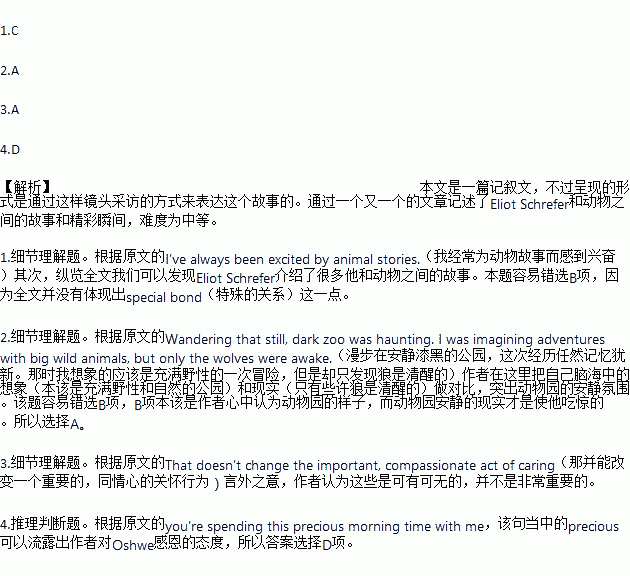题目内容
Meet the amazing Eliot Schrefer, and see why we’re big fans!
Scope: Why do you write stories about animals?
Eliot: I’ve always been excited by animal stories. When I was young, I liked reading about animals because they seemed like they needed help, and they were also voiceless.
Scope: Where did you get the idea for Animal Distress Calls?
Eliot: Many years ago, I had a friend who worked as a doctor at the Bronx Zoo. One evening he invited me to see the zoo after hours. Wandering that still, dark zoo was haunting. I was imagining adventures with big wild animals, but only the wolves were awake. Then he took me into the clinic, where I met a sick bird. That nighttime visit clearly had a big impact on this story.
Scope: Why did you leave Josie’s fate ambiguous in the story Animal Distress Calls?
Eliot: So many of us have known a creature, human or nonhuman, who’s been suffering. Sometimes everything gets better, and sometimes it doesn’t. That doesn’t change the important, compassionate act of caring. I didn’t want the story to become about the outcome of Josie’s illness. I wanted it to be about the sympathy Josie and Julia share for each other.
Scope: Have you had a personal experience with an animal that changed you?
Eliot: I had a moment during research for my ape novels when I was staying at a bonobo sanctuary in Congo. I’d have breakfast with Oshwe, a young bonobo who was too little to eat with the rest of the group. Sitting with him for a few hours each morning, I helped make sure that he finished his meal and got the nutrition he needed---but it also felt like a gift he was giving me. Oh, I remember thinking, you’re spending this precious morning time with me!
1.What is Eliot Schrefer famous for according to the text?
A. Being an animal doctor B. His special bond with animals
C. His amazing animal stories D. Being a volunteer taking care of animals
2.What was Eliot Schrefer surprised by while visiting the Bronx Zoo?
A. The quiet atmosphere B. The active wolves
C. His friend’s behavior D. The violent wild animals
3.Why did Eliot Schrefer leave Josie’s fate ambiguous?
A. Because he thought it was not important
B. Because he wanted readers to make a guess
C. Because he wanted to attract readers’ attention
D. Because he would make it clear in his next story
4.What was Eliot Schrefer’s attitude towards Oshwe?
A. Proud B. Frightened
C. Disappointed D. Appreciative
 阅读快车系列答案
阅读快车系列答案
